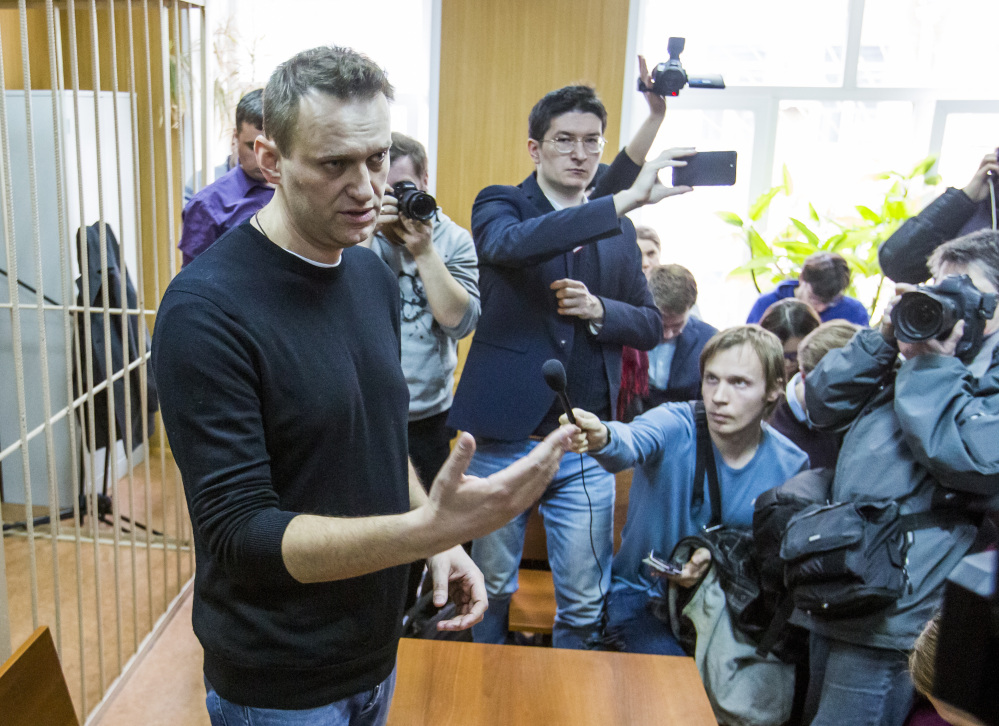MOSCOW — The wave of nationwide demonstrations that shook Russia’s long dormant political scene over the weekend showed a new face of protest: mostly teenage demonstrators driven by accusations of high-level official corruption, glaring amid the nation’s painful two-year recession.
A year before facing re-election, President Vladimir Putin has a dilemma: to further tighten the screws or to devise more artful means for keeping a lid on dissent. On Monday, a Moscow court handed a 15-day jail term to the protest organizer, Alexei Navalny, whose charisma and social media savvy helped rally the young.
Navalny was arrested as he walked to a protest in Moscow on Sunday and spent the night in jail before showing up in court. Police have arrested more than 1,000 people for taking part in the unauthorized protest in the capital, and many of them face jail sentences or fines. Navalny’s anti-corruption foundation has promised to offer legal assistance to all those who were arrested.
“Even the slightest illusion of fair justice is absent here,” Navalny told reporters Monday from the defendant’s bench, complaining about the judge striking down one motion after another. “Yesterday’s events have shown that quite a large number of voters in Russia support the program of a candidate who stands for fighting corruption. These people demand political representation – and I strive to be their political representative.”
Journalists and well-wishers packed the courtroom in central Moscow, where Navalny, in a selfie posted on Twitter, declared: “A time will come when we’ll put them (the authorities) on trial too – and that time it will be fair.”
The 40-year-old Navalny, Russia’s most popular opposition leader, has had three convictions on fraud and embezzlement charges that he dismisses as politically motivated. Even though the convictions technically disqualify him, he has announced a presidential bid for 2018.
With his colorful and sarcastic expose of Prime Minister Dmitry Medvedev’s alleged collection of mansions, villas and vineyards – which garnered over 13 million views on YouTube – Navalny managed to draw tens of thousands to the streets across Russia in the biggest show of defiance since a 2011-2012 wave of protests rattled the Kremlin and led to harsh new laws aimed at suppressing dissent.
On Monday, Putin met with senior officers of the National Guard, which took part in arresting participants in the demonstrations along with police, but he didn’t mention the protest. Russian state television completely ignored the demonstrations in their broadcasts Sunday, and Medvedev refrained from comment.
“The question now is what kind of balance between propaganda and repression the government will choose,” said Andrei Kolesnikov, a political analyst with the Carnegie Moscow Center. “The government needs to preserve itself for another presidential term – if not forever – and now there is an important moment when the government is choosing its strategy and tactics.”
Medvedev’s job had reportedly been in jeopardy amid infighting among various factions in the Kremlin, but now his tenure seems secure as his dismissal would look like caving in to protesters’ demands – something Putin never does.
The Kremlin has long sought to cast the opposition as a phenomenon of a privileged Westernized urban elite.
Send questions/comments to the editors.



Success. Please wait for the page to reload. If the page does not reload within 5 seconds, please refresh the page.
Enter your email and password to access comments.
Hi, to comment on stories you must . This profile is in addition to your subscription and website login.
Already have a commenting profile? .
Invalid username/password.
Please check your email to confirm and complete your registration.
Only subscribers are eligible to post comments. Please subscribe or login first for digital access. Here’s why.
Use the form below to reset your password. When you've submitted your account email, we will send an email with a reset code.